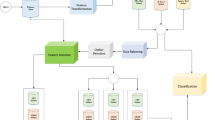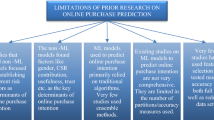Abstract
This paper is to uncover the key factors that influence purchase intention of customers through analysing technology acceptance theories/models, in the current online-to-offline (abbreviated as O2O) mobile commerce, and to improve the prediction accuracy of consumers’ adoption behaviour by utilizing machine learning based methods. With a huge amount of smart phone users, O2O mobile commerce derived from electronic commerce (abbreviated as e-commerce) has been growing vastly. There are many research interests has been attracted on online banking, digital wallet, E-tickets, order tracking, supply chain and so on. However, there is little specific study about O2O mobile APP consumers’ adoption behaviour. Motivated from the commonly used technology acceptance theories/models, especially, the Unified Theory of Acceptance and Use of Technology (UTAUT) model, this paper is to identify key influencing factors of O2O mobile APP consumers’ adoption behaviour. Then, a new model is proposed as an extended version of UTAUT. The new model has been validated through a survey questionnaire conducted in target groups. More significantly, treating consumers adoption behaviour as a binary classification problem, we apply two different types of machine learning based approaches(Linear Discriminant Analysis(LDA) and Logistic Regression(LR)) to predicate the possible action result by taking into consideration of all influencing factors from the collected survey data. Comparing against several other conventional approaches, Logistic regression shows the better predication accuracy. Hence, it will provide better guidance for promotion strategies in a more productive way.
Access this chapter
Tax calculation will be finalised at checkout
Purchases are for personal use only
Similar content being viewed by others
References
The 41st China Statistical Report on Internet Development. http://www.cnnic.net.cn/hlwfzyj/hlwxzbg/hlwtjbg/201803/t20180305_70249.htm (2018)
Online- to- Offline Commerce. https://www.investopedia.com/terms/o/onlinetooffline-commerce.asp, 6 Feb 2018
O2O: Why China leads the “online to offline” revolution. https://www.innovationiseverywhere.com/o2o-why-china-leads-the-online-to-offline-revolution/, 15 Feb 2018
CNNIC Introduction. http://cnnic.com.cn/AU/Introduction/Introduction/201208/t20120815_33295.htm, 1 Mar 2018
Mobile Application (Mobile APP). www.techopedia.com/definition/2953/mobile-application-mobile-app, 2 Feb 2018
Fishbein, M., Ajzen, I.: Belief, attitude, intention and behavior: an introduction to theory and research. Addison-Wesley, Reading (1975)
Samaradiwakara, G.D.M.N., Gunawardena, C.G.: Comparison of existing technology acceptance theories and models to suggest a well improved theory/model. Int. Tech. Sci. J. 1(1), 21–36 (2014)
Ajzen, I.: From intentions to actions: a theory of planned behavior. In: Kuhl, J., Beckmann, J. (eds.) Action Control. SSSP Springer Series in Social Psychology, vol. 2, pp. 11–39. Springer, Berlin/Heidelberg (1985)
Ajzen, I.: The theory of planned behavior. Organ. Behav. Hum. Decis. Process. 50(2), 179–211 (1991)
Theory of planned behavior. https://en.wikipedia.org/wiki/Theory_of_planned_behavior#cite_note-Aizen1991-1 #cite-note-Aizen1991-1 2018/4/6
Davis, F.D.: Perceived usefulness, perceived ease of use, and user acceptance of information technology. MIS Q. 13(3), 319–340 (1989)
Venkatesh, V., Morris, M.G., Davis, G.B., Davis, F.D.: User acceptance of information technology: toward a unified view. MIS Q. 27(3), 425–478 (2003)
Alshehri, M., Drew, S., Alhussain, T., Alghamdi, R.: The effects of website quality on adoption of e-government service: an empirical study applying UTAUT model using SEM. In: 23rd Australasian Conference on Information Systems, pp. 1–13. Deakin University, Geelong (2012)
Jaradat, M.I.R.M., Rababaa, M.S.A.: Assessing key factor that influence on the acceptance of mobile commerce based on modified UTAUT. Int. J. Bus. Manag. 8(23), 102–112 (2013)
Rodröguez, T.E., Trujillo, E.C.: Online purchasing tickets for low cost carriers: an application of the unified theory of acceptance and use of technology (UTAUT) model. Tour. Manag. 43, 70–88 (2014)
Lin, P.C., Lin Y.C.: A study of the factors affecting the purchase intention on mobile game apps. J. Adv. Inf. Technol. 7(4), 239–244 (2016)
Machine learning. https://en.wikipedia.org/wiki/Machine_learning, 8 May 2018
Top 5 machine learning applications for e-commerce. https://techblog.commercetools.com/top-5-machine-learning-applications-for-e-commerce-268eb1c89607, 10 May 2018
Hao, W.X., Li, S., He, Y., et al.: Connecting social media to e-commerce: cold-start product recommendation using microblogging information. IEEE Trans. Knowl. Data Eng. 28(5), 1147–1159 (2016)
Shankar, D., Narumanchi, S., Ananya, H.A. et al.: Deep learning based large scale visual recommendation and search for e-commerce. ARXIV eprint arXiv:1703.02344 (2017)
Spens, H., Lindgren, J.: Using cloud services and machine learning to improve customer support. Uppsala University, Uppsala (2018)
To, M.L., Ngai, E.W.T.: Predicting the organizational adoption of B2C e-commerce: an empirical study. Ind. Manag. Data Syst. 106(8), 1133–1147 (2006)
Shi, F., Marini, J.L.: Can e-commerce recommender systems be more popular with online shoppers if they are mood-aware? In: Proceedings of the 12th International Conference on Web Information Systems and Technologies (WEBIST 2016), vol. 2, pp. 173–180. Science and Technology Publications, Setúbal, Portugal (2016)
Abrahão, R.S., Moriguchi, S.N., Andrade, D.F.: Intention of adoption of mobile payment: an analysis in the light of the Unified Theory of Acceptance and Use of Technology (UTAUT). RAI Revista de Administração e Inovação 13(3), 221–230 (2016)
Goswami, A., Dutta, S.: E-commerce adoption by women entrepreneurs in India: an application of the UTAUT model. Bus. Econ. Res. 6(2), 440–454 (2017)
Lee, D.C., Lin, S.H., Ma, H.L., Wu, D.B.: Use of a modified UTAUT model to investigate the perspectives of internet access device users. Int. J. Hum. Comput. Interact. 33(7), 549–564 (2017)
Tak, P., Panwar, S.: Using UTAUT 2 model to predict mobile app based shopping: evidence from India. J. Indian Bus. Res. 9(3), 248–264 (2017)
Zhou, T., Lu Y., Wang, B.: Integrating TTF and UTAUT to explain mobile banking user adoption. Comput. Hum. Behav. 26(4), 760–767 (2010)
Yu, C.S.: Factors affecting individuals to adopt mobile banking: empirical evidence from the UTAUT model. J. Electron. Commer. Res. 13(2), 104–121 (2012)
Chae, M., Kim, J., Kim, H., Ryu, H.: Information quality for mobile internet services: a theoretical model with empirical validation. Electron. Mark. 12(1), 38–46 (2002)
Filieri, R., McLeay, F.: E-WOM and accommodation: an analysis of the factors that influence travelers’ adoption of information from online reviews. J. Travel Res. 53(1), 44–57 (2013)
Koivumäi, T., Ristola, A., Kesti, M.: The effects of information quality of mobile information services on user satisfaction and service acceptance-empirical evidence from Finland. Behav. Inform. Technol. 27(5), 375–385 (2008)
Albashrawi, M., Motiwalla, L.: When IS success model meets UTAUT in a mobile banking: measuring subjective and objective system usage. In: SAIS 2017 Proceedings, pp. 1–6. AIS, Georgia (2017)
Han, R., Tian, Z.: Effects of alternative promotion types on consumers’ value perception and purchase intentions. Manag. Sci. China 18(2), 85–91 (2005)
He, L.: Research on price promotion strategy based on consumer perception. Southwest Jiao Tong University, Chengdu (2008)
Raghubir, P., Inman, J.J., Grande, H.: The three faces of consumer promotions. Calif. Manag. Rev. 46(4), 23–42 (2004)
Xiao, C.: Research on factors and their effect on college student behavior intention on online shopping. Shanghai Jiao Tong University, Shanghai (2007)
Weng, J.T., Run, E.C.: Consumers’ personal values and sales promotion preferences effect on behavioural intention and purchase satisfaction for consumer product. Asia Pac. J. Mark. Lofistics 25(1), 70–101 (2013)
Neha, S., Manoj, V.: Impact of sales promotion tools on consumer’s purchase decision towards white good(refrigerator) at Durg and Bhilai Region of CG, India. Res. J. Manag. Sci. 2(7), 10–14 (2013)
Roehrich, G.: Consumer innovativeness concepts and measurements. J. Bus. Res. 57(6), 671–677 (2004)
Midgley, D.F., Dowling, G.R.: Innovativeness: the concept and its measurement. J. Consum. Res. 4(4), 229–242 (1978)
Gui, M.J.: Empirical study on the influential factors of the using intention of individual online banks. Zhejiang University, Hangzhou (2007)
Bauer H.H., Barnes, S.J., Reichardt, T., Neumann M.M.: Driving consumer acceptance of mobile marketing: a theoretical framework and empirical study. J. Electron. Commer. Res. 6(3), 181–192 (2005)
Ho, C.H., Wu, W.: Role of innovativeness of consumer in relationship between perceived attributes of new products and intention to adopt. Int. J. Electron. Bus. Manag. 9(3), 258–266 (2011)
Chao, C.W., Reid, M., Mavondo, F.T.: Consumer innovativeness influence on really new product adoption. Australas. Mark. J. 20(3), 211–217 (2012)
Lassar, W.M., Manolis, C., Lassar, S.S.: The relationship between consumer innovativeness, personal characteristics, and online banking adoption. Int. J. Bank Mark. 23(2), 176–199 (2004)
Trevor, H., Robert, T., Jerome, H.F.: The elements of statistical learning: data mining, inference, and prediction. Math. Intell. 27(2), 83–85 (2005)
Cox, D.R.: The regression analysis of binary sequences. J. R. Stat. Soc. 20(2), 215–242 (1958)
Jamieson, S.: Likert scales: how to (ab)use them. Med. Educ. 38(12), 1217–1218 (2004)
Author information
Authors and Affiliations
Corresponding author
Editor information
Editors and Affiliations
Rights and permissions
Copyright information
© 2020 Springer Nature Singapore Pte Ltd.
About this paper
Cite this paper
Li, X., Zheng, L. (2020). Consumers Adoption Behavior Prediction through Technology Acceptance Model and Machine Learning Models. In: Rahman, A. (eds) Statistics for Data Science and Policy Analysis. Springer, Singapore. https://doi.org/10.1007/978-981-15-1735-8_24
Download citation
DOI: https://doi.org/10.1007/978-981-15-1735-8_24
Published:
Publisher Name: Springer, Singapore
Print ISBN: 978-981-15-1734-1
Online ISBN: 978-981-15-1735-8
eBook Packages: Mathematics and StatisticsMathematics and Statistics (R0)




